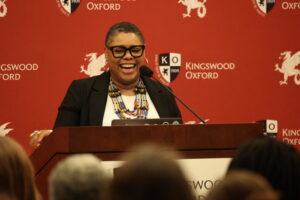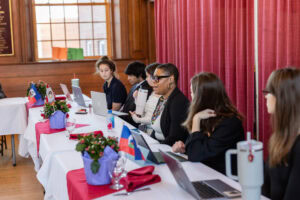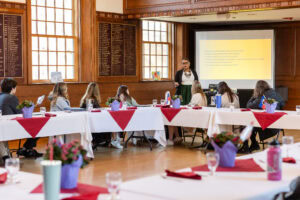January 18, 2024
English Symposium Author Ibi Zoboi Exhorts Students to Speak Their Truth
New York Times best-selling author and finalist for the National Book Award, Ibi Zoboi, addressed the KO community on Friday, Jan. 12, as the 41st Warren Baird Symposium author. She joins an esteemed line-up of literary giants who workshop in a symposium class with our seniors. Bill Martino, chair of the English department, said of the program, “It’s a testament to KO’s commitment to intellectual curiosity, literary scholarship, and the power of storytelling.” In immersing themselves in her work, our students do not merely devote their time to textual explications but also flex their muscles in areas of passion such as collages, podcasts, musical compositions, dance routines, and sculpture to make the study of Zoboi particularly personal.
Two symposium students, Emma Barringer ‘24 and Saanve Bathula ‘24, who introduced Zoboi to the community, provided a short synopsis of each of the novels they read with the community: Black Enough, Love is Wise, My Life as an Ice Cream Sandwich, Pride, Sorry Child, American Street, Punching the Air (based on the story of Yusef Salaam, one of the exonerated Central Park Five), and Nigeria Jones. “She has a niche for herself in contemporary literature, seamlessly blending cultures, identity, and the complexities of the human experience,” the students said. “Her words resonate with authenticity, offering readers a profound exploration of themes across genres. Her stories unfold a tapestry of emotions and cultural richness.”
Zoboi expressed gratitude for the warm welcome and acknowledgment of her work. She reflected on her journey as a writer and the importance of speaking one’s truth in times of uncertainty. Zoboi shared insights into her upcoming book, Tell a Story, Rule the World, inspired by the quote, “Those who tell the story rule the world.”
Born in Haiti, Zoboi discussed the significance of her background and her responsibility to document truths, even if they are uncomfortable or unpopular. “I don’t always want to be nice,” she said. “I don’t always want to say the things that people want to hear. I want to tell the truth.” She emphasized the importance of agitating and being passionate about beliefs as artists and writers, encouraging the audience to speak their truth into the world.
Zoboi delved into the challenges of navigating truth and belonging, using an excerpt from her book Nigeria Jones to illustrate the struggle of reconciling lived experiences with societal expectations. Nigeria, who attends a majority white private school, shares personal experiences of her father, exposing her to stories about slavery and racism from a young age, emphasizing the weight of carrying such knowledge. “I wrote this,” Zoboi said, “because this is what it feels like to read and know and understand history and how to make sense of that history and keep going to be an artist and how to separate truth from what’s supposed to be true and what makes you feel uncomfortable or comfortable in spaces where you don’t always feel welcomed.”
The author expressed her commitment to creating dangerously, quoting Haitian American writer Edwidge Danticat.” Creation,” Zoboi said, is not always in the traditional means of writing or painting but rather “whatever it is that you put out into the world.” She spoke about the impact of her banned book, American Street, and how it continues to be taught in schools despite the challenges of people losing their livelihoods. Zoboi encouraged the audience, especially young people, to be passionate about positive causes, question everything, and use their voices to create change.
“If there’s a truth that you want to be heard, that you want to tell, but your voice shakes to tell it. And you know that truth will liberate others; here’s how you create dangerously,” Zoboi said.
Zoboi touched on the concept of radical imagination, urging the audience to think critically about the future. As an author who generally writes for young people and an aficionado of science fiction, Zoboi said she often thinks of the future. In an interactive exercise, she asked the audience to imagine the world in 2044, addressing topics like flying cars, implanted phones, the existence of schools, the United States, democracy, capitalism, and the role of tech giants like Meta.
She emphasized the role of individuals in shaping the future, tying it back to her writing for young people and the impact she hopes her books will have in 2044. Zoboi encouraged free thinking, embracing one’s unique beauty, and creating with compassion. She concluded by discussing her Haitian roots and the legacy of the Haitian Revolution, expressing gratitude for being welcomed and making space for diverse voices at the symposium.
“Even if you don’t share my background,’ she said. “It lets others know that you will make space for all voices so that it impacts humanity.”
